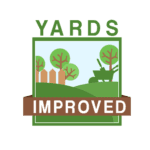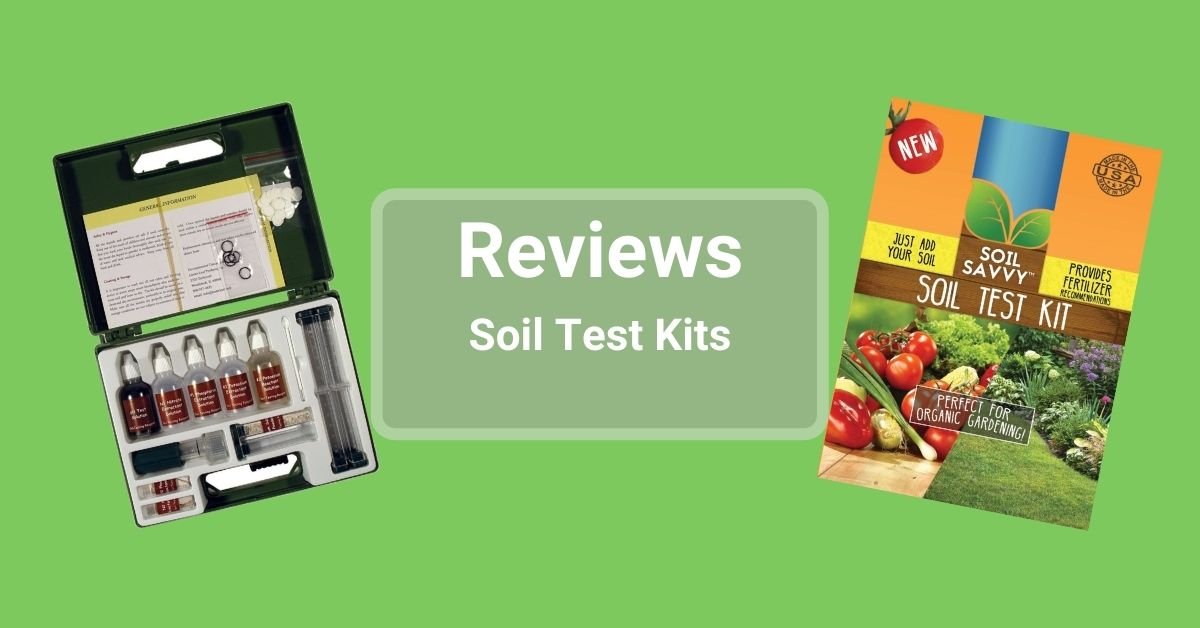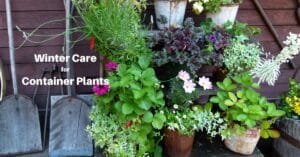If you’ve ever tried growing a plant, you know that not all soil is created equal. Various chemicals need to be in balance so that your flora can flourish. Fortunately, you can buy a test kit to check these levels.
Soil test kits provide you with a quick evaluation of the most important chemicals in your lawn, garden, or flower pots. From there, you can take steps to add fertilizer and other treatments to create optimal conditions.
Like many tools, some soil test kits have the minimum necessities. Others are good enough for industrial-level organic farming. So before we get into reviews of soil testing kits, let’s talk about what you need to know.
Most Important Tests
A couple of factors affect how good your soil is for plants. Different types of vegetation like different chemical makeups. So before you invest, it’s good to know what plants will grow best for you.
The most crucial levels to be aware of are pH, nitrogen, and potassium. Once you’re aware of these levels, you’ll be able to fertilize your lawn for the maximum effect.
pH
The pH level is a 14-point scale that measures how acidic or alkaline something is. In the middle – 7.0 – is neutral. Acids have lower pHs, and alkalines are above 7.
Most plants prefer a pH that’s close to neutral, leaning slightly toward acidic. A good range is 6.2 to 7.2. But there are some, such as daylilies, mums, and foxglove, that thrive with more alkaline soil. That is, they like a higher pH. On the other hand, hydrangeas, and blueberries like a pH under 5.5!
The pH affects the plant itself, the levels of other chemicals in the soil, and even the microbes that will make their home there. So it’s easy to see the impact it plays on the success or failure of your gardening efforts! No soil test kit should be without a pH test.
Nitrogen
Nitrogen is a major source of nutrition for plants. It’s one of the key ingredients in fertilizer.
If your test kit is going to read more than one level, this should be the second option, right after pH.
Since plants depend on nitrogen for growth, they’ll deplete the level, so it’s good to perform this test regularly!
Potassium
Potassium is another crucial element for plant growth. It helps increase growth and affects how many flowers and vegetables grow.
A test for potassium levels should be your third most important consideration when picking a soil test.
When you buy fertilizer, you’ll see NPK ratios on the bag. The letter K is for potassium.
Phosphorus
This chemical element is as important for plants as nitrogen and potassium. It’s the “P” in NPK on fertilizer bags.
Other Helpful Tests
Some soil test kits are more expansive or include other tests. Here are some of the most common ones.
Moisture
Many soil test kits will tell you how damp the soil is. Of course, adequate water getting to your plant’s roots is vital! We don’t consider this test more important because it’s pretty easy to figure out the moisture level without it – just stick a screwdriver into the soil and pull it out.
Sunlight
Plants need sun, too. Of course, the amount they need depends on the type of plant. This gauge can help measure whether adequate light reaches your garden. But it’s pretty easy to do this just by observation, too. The test is more of a luxury than a necessity.
Best Soil Test Kits, Reviewed
We’ve looked at a range of soil test kits that cut across all types of tests. Here are our recommendations for the best of the best.
Soil Savvy – Soil Test Kit
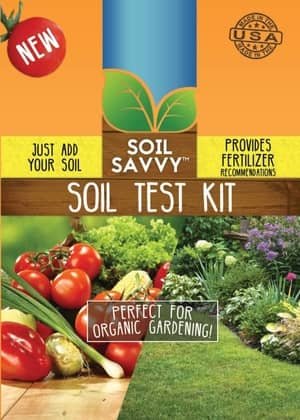

This test is a bit different than any others on our list. And it’s the only non-reusable test. But if you want the most in-depth analysis of your soil, this is the way to go.
Most test kits give you instant answers based on chemical reactions or meters that you use yourself. In this case, though, you send a sample of your soil to a lab and get a detailed report back. The report goes far beyond just your NPK levels and looks at many other factors, as well.
It’s an easy test to use – just fill a jar with soil and mail it using the enclosed packet. In 10 days or less, you’ll get results by email.
If you’re serious about getting things just right in your yard, this is a great way to go. It may be too much for most people though. The price tag for this single test is similar to what you’ll pay for other tests that give only the most important information but are usable over and over again.
We love the ease and the in-depth information. For that, this can’t be beat. But you don’t need this level of detail all the time.
Luster Leaf Products 1663 Professional Soil Kit
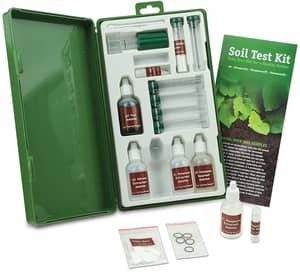
This is a do-it-yourself kit that provides great results. You can test for pH, nitrogen, phosphorus, and potassium 20 times each using the test strips and reagents included. It’s a great way to assess your soil’s needs.
This type of test might make you remember the days in high school chemistry class. Or you might be used to it if you use test strips for your swimming pool’s water.
You add a little soil to a small vial then add a few drops from a bottle. Stick a test strip in and see what color it turns. This color matches up against the guide which tells you the levels.
It’s easy to do and gives good results. And with twenty of each test, it should last you a good while.
The plastic case is nice, too.
It does take a bit of time to do testing this way, so you need a little patience to gather and prepare the soil. Also, replacement reagents aren’t available specifically for this kit.
Rapitest Premium Soil Test Kit
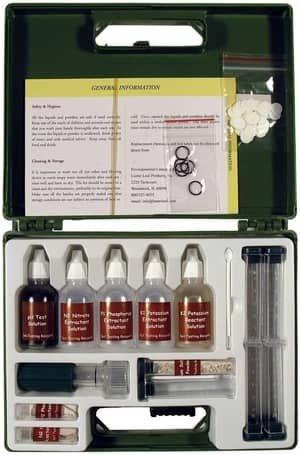
This kit offers reagent testing of pH, nitrogen, potassium, and phosphorus. It’s not difficult to use but it does take a little time to prepare the samples.
Your results on the test strips match up against a chart that tells you if the levels are deficient or sufficient; the pH test gives readings in half-point intervals.
The kit and pieces are sturdy and will hold up if treated right. The only drawback is that you can’t buy replacement reagents for the kit. We imagine you can find them somewhere, but they’re not marketed specifically for this.
Luster Leaf 1605 Digital Soil Test Kit
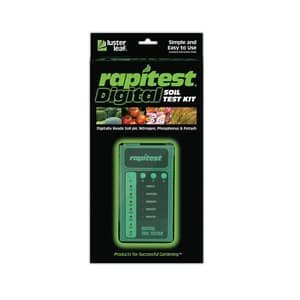
Want a simpler way to read the test results? This digital meter might be for you. It still tests pH and the three major chemicals and uses reagents for the test. But instead of test strips, you insert the vials in the reader. A light will show what the levels are.
It’s a nice kit, but the only reading the results is simplified. You still have to prepare the soil for testing in the same way. Still, at least it’s one step to making life simpler – no more trying to match the shade of a tiny piece of paper with a chart!
The results are accurate and give a rough, though not exact, reading. For pH, that’s within 0.5.
You can test pH ten times with this kit. There is enough solution for five of each of the other tests.
Soil Moisture Meter
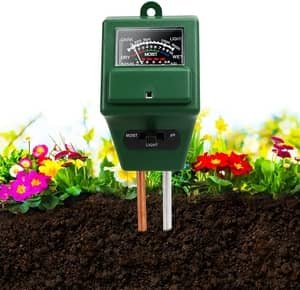
This last meter only hits on one of the most important tests but does include a couple of optional ones. But it’s also so simple to use, that we felt we should include it here.
Simply stick this into the soil – even in a flowerpot. It will give you an analog reading of your pH, moisture level, and the amount of sunlight reaching your plant.
To get the various readings, you move a switch below the meter. It takes about 20 minutes for the reading to “settle.”
No batteries are necessary to use this.
It does its job well. If you have another way to test NPK, this is fine. Some people seem to have trouble with the pH reading incorrectly, but that seems to be a rare defect.
Conclusion
Your lawn and garden will thrive when all the necessary chemicals are in the right balance. A soil test kit will help you assess how you need to treat your soil and how it changes over time. It’s a wonderful addition to your supplies to help make your garden prosper!
